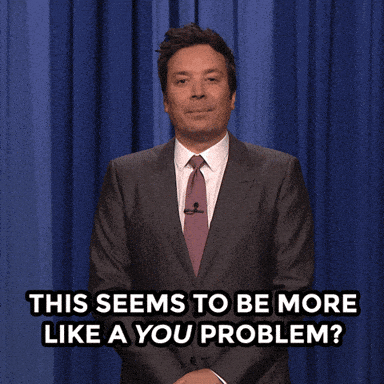- Epic Insights by Sukun
- Posts
- The Psychology of Blame, Conquering Life Dysmorphia and Ending Arguments
The Psychology of Blame, Conquering Life Dysmorphia and Ending Arguments
What’s in store today:
-The psychology of blame
-Conquering life dysmorphia
-A simple way to end arguments
One of the biggest destroyers of relationships, companies, and cultures is our tendency to indulge in the blame game.
The overwhelming pressures of life’s stresses and demands make us play the victim by externalizing responsibility to things outside our control in our environment.
Since this behavior is more common than we like to admit, it’s worth exploring the psychology of blame.
Our need for looking good and protecting our image is extremely high. Feeling undeserving of approval or recognition is as good as a threat to survival.
This dependency on validation almost shapes our sense of success and happiness.
We despise looking incompetent or associating with failure...
This is where victimhood comes into the picture. It’s the easiest way to avoid responsibility and make ourselves look innocent.
If you think about it, this started right from the time we were toddlers.
Ever remember saying things like :
the milk spilled instead of “I accidentally spilled the milk”, or
The lamp broke as if it committed suicide when you tried turning it on.
In our brains, responsibility becomes synonymous with guilt. So we do anything to avoid it, often forgetting that in the process of claiming our innocence, we give up our power.
It’s impossible to be part of the solution without owning the problem.
Choicelessness is a great place to hide because it feels safe.
But the question one needs to ask is:
Do I want to be a mere spectator of my life by outsourcing my power to others?
OR
The architect of it by taking responsibility and owing my choices?
Conquering Life Dysmorphia
Body dysmorphia is a common problem experienced by people with weight issues.
It’s described as an obsessive concern over perceived defects and flaws in one’s appearance.
Applying this to the construct of our modern world, many of us suffer from what could be termed as ‘life dysmorphia’.
A quick scroll on social is enough to remind us of the lack in our lives, all the goals that haven’t been accomplished, and the constant shortage of material thrills.
Compared to a hundred years ago, today we live king-sized lives yet complain like peasants.

Practicing gratitude can put things in perspective and serve as a reminder of just how much there is to be grateful for.
Comedian Jimmy Carr has a perfect way to measure how happy you are:
Your quality of life minus how envious you feel.
The antidote to envy is to focus on all that you have rather than what you lack.
As a positive side-effect, doing so enhances your life experience, leaving you feeling happier and more fulfilled.
A simple way to end arguments
The single biggest reason behind most arguments is not listening well enough.
When consumed by the heat of the moment, and stuck in defense mode understanding the other person’s perspective becomes impossible.
If you want to end arguments and save your relationships, consider these 3 questions :
Am I really listening here?
How can I better prioritize this person’s feelings?
What’s one step I can take to make them feel more understood?
The next time you find yourself entertaining the conflict zone, give these questions a shot and watch your conversation shift.
